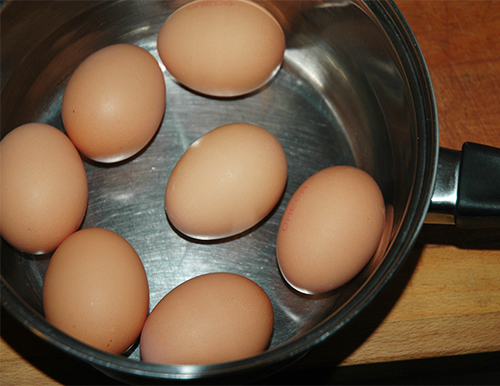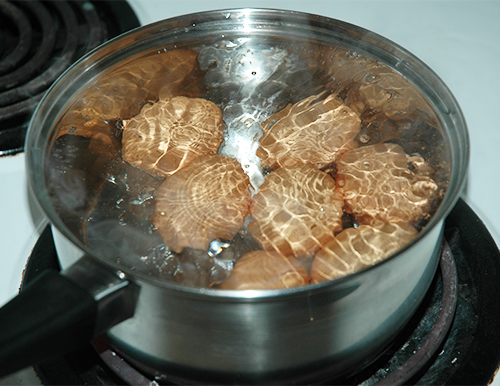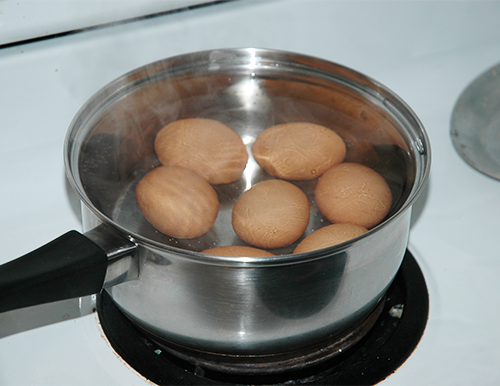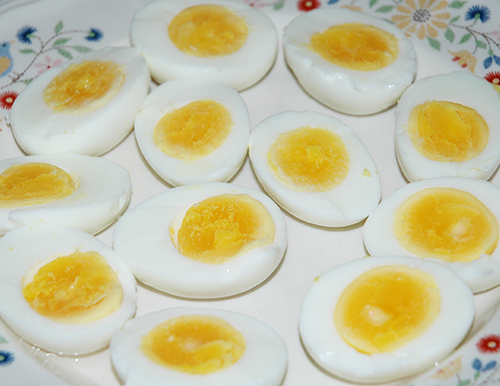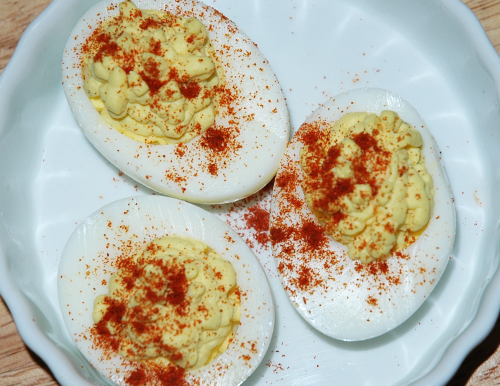Jump to Ingredients – Jump to Method – Jump to Printable Version
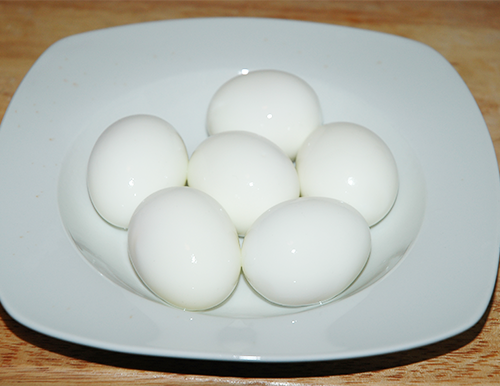 Making hard boiled eggs is pretty straight forward, but the most difficult thing about it is cooking them just right, so that they are easy to peel. It really sucks to boil a bunch of eggs only to find, when you try to peel them, they get shredded into twenty little pieces because the shell just won’t let go!
Making hard boiled eggs is pretty straight forward, but the most difficult thing about it is cooking them just right, so that they are easy to peel. It really sucks to boil a bunch of eggs only to find, when you try to peel them, they get shredded into twenty little pieces because the shell just won’t let go!
Difficult to peel eggs are just going to happen sometimes, no matter what you do, but by using certain techniques, you can greatly lessen the chances of it happening. There is no one best way to cook hard boiled eggs, but most people who make them often have their favourite methods, and this is mine.
This method is designed for cooking large standard eggs. Smaller or larger eggs may require different times.
-Ingredients-
Eggs
How ever many you want to make! It is best to only cook as many as you can fit on the bottom of the pot your are using. You may use way fewer than it takes to cover the whole bottom of the pot, but you do not want to stack them in the pot.
You may use fresh eggs or eggs that are a couple of weeks old. Newer eggs will be more likely to give you a hard time peeling them, but they will not always be difficult. Older eggs are more likely to peel easily, but there is no 100% guarantee about this either.
-Method-
Place the eggs gently into the pot in a single layer. They can be cold directly out of the refrigerator. Some people swear that they cook better if you let them come to room temperature first. I usually do not bother with this step, but if you would like to try it, just let them set out on the counter for about 20 minutes before you begin.
Fill the pot with enough cold water to submerge the eggs about an inch deep.
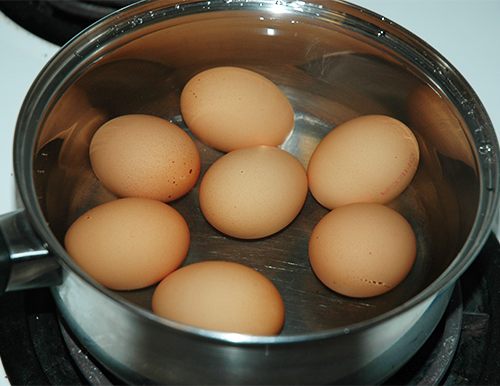 Place the pot onto a stove set at the highest heat. Allow the water to come to a complete rolling boil.
Place the pot onto a stove set at the highest heat. Allow the water to come to a complete rolling boil.
Do not be afraid of letting the water get too hot. Just let the boil happen. Once a real boil gets going, let it boil away for 20, 30, 40, seconds, or even up to a minute. Just long enough so that you are sure you really have a nice boiling heat. What I am trying to prevent you from doing is turning the heat off the second you see a bubble or two pop. That would be too early. You do not want to let them boil for long, but up to a minute will be ok.
Once a good boil is reached, immediately take the pot off of the heat. Allow the eggs to sit in the hot water for 11 minutes exactly.
This gentle heat will prevent the eggs from cracking during cooking. I have never lost an egg using this method.
After exactly 11 minutes, pour cold water into the pot, directly into the hot water. Slowly, start pouring out the hot water as you continuously add cold water to the pot. The point of this is to quickly, but not immediately immerse the hot eggs into very cold water. The transition should take at least 30 seconds.
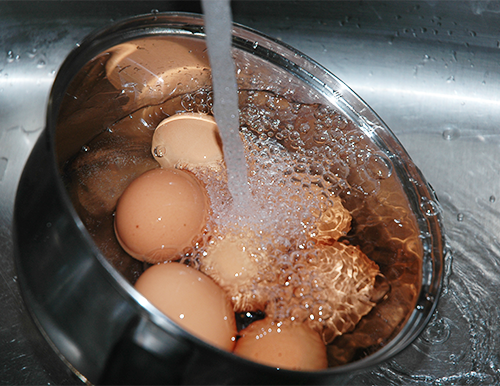 Allow the eggs to sit in the cold water for at least 20 minutes. At this point you can do whatever you want with them. You may peel and use them right away or store them, unpeeled in the refrigerator for later use.
Allow the eggs to sit in the cold water for at least 20 minutes. At this point you can do whatever you want with them. You may peel and use them right away or store them, unpeeled in the refrigerator for later use.
When you want to peel them, tap the eggs on all sides on a hard surface until it is covered in cracks.
It is usually easiest to start peeling them on the round end. Hold them under running water, or in a pot of cool water to aid in the peeling. If you did everything right and the stars are aligned in your favour the peel should come off easily. The one I am peeling in the picture below came off in almost one piece.
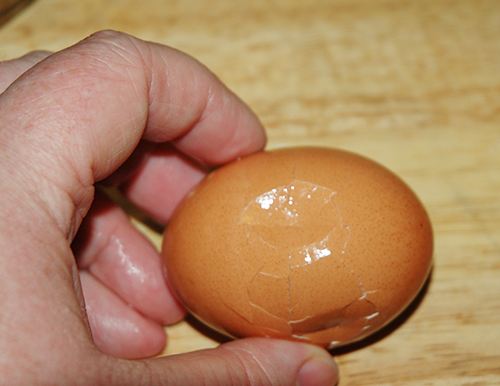
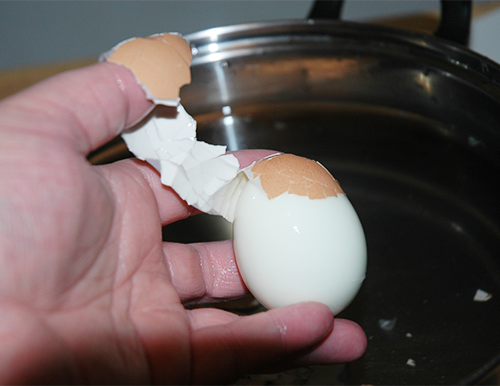 I sliced all of the eggs in half because I was making deviled eggs and because I wanted to show how well they are cooked. Notice that the yolks are bright yellow. If they are overcooked they can turn grey or green. These yolks are just cooked. In fact, a couple of them have a little tiny wet spot directly in the middle. This spot is right on the border of becoming completely solid. If you see this, do not think that the eggs are undercooked (they are not runny). This is perfection! If they cooked the slightest bit more and the wet spot is not there, they are still perfect. Just as long as the yolk is pretty much fully solid and it only just barely got there, you have cooked a perfect hard boiled egg. The degree to which they are cooked will vary slightly, so sometimes you will have this sign and sometimes you will not, but they will never be under, or over cooked if you follow this method.
I sliced all of the eggs in half because I was making deviled eggs and because I wanted to show how well they are cooked. Notice that the yolks are bright yellow. If they are overcooked they can turn grey or green. These yolks are just cooked. In fact, a couple of them have a little tiny wet spot directly in the middle. This spot is right on the border of becoming completely solid. If you see this, do not think that the eggs are undercooked (they are not runny). This is perfection! If they cooked the slightest bit more and the wet spot is not there, they are still perfect. Just as long as the yolk is pretty much fully solid and it only just barely got there, you have cooked a perfect hard boiled egg. The degree to which they are cooked will vary slightly, so sometimes you will have this sign and sometimes you will not, but they will never be under, or over cooked if you follow this method.
Now it is time to make some Deviled Eggs!
-Printable Version-
HARD BOILED EGGS
Ingredients:
Eggs (large)
Method:
1. Place eggs into pot in single layer.
2. Cover with cold water until they are about an inch deep.
3. Place on stove on high heat.
4. Allow the water to come to a rolling boil.
5. Immediately take the pot off of the heat and allow the eggs to sit in the hot water for exactly 11 minutes.
6. Slowly pour out the hot water as you add cold water. Immerse the eggs in cold water for at least 20 minutes or up to a couple hours.
7. Peel and use, or store them in the refrigerator for later use.

